|
|||||||||||||||||||||||||||||||||
| Facts > Getting Started > Ancient Civilization | |||
| |
Ancient Civilization |
Sources |
| Ancient civilization—like ours, only different |

You won't understand the beginnings of Christianity until you understand the ideas that formed the culture that formed the religion. |
|
We've reinterpreted their myth to fit our own ideas. And we got it wrong. We got it wrong because the way we understand the universe is way far different from how the ancients understood it, and we didn't take the time to figure out how they saw things. Christianity is an ancient religion. It comes from a culture that thought the sky was a solid dome that needed holding up. You won't ever understand the beginnings of Christianity until you understand the ideas that formed the culture that formed the religion. If the history of Christianity interests you, you'll have to get over just lining up a few of their facts with your modern ideas. You'll have to learn how the ancients saw the universe before you can see how their myths and legends and religions fit in with their ideas about how the world worked. |
It wasn't always so.
There were Ancient Chinese too. We're not talking about them. |
A
misconception: ancient history is
all snooty fingernail on the blackboard poetry, and emperors. |
| Another
misconception: the ancients were
primitive simpletons. |
|||||||
And the incredible thing is, think about this: they invented it all! Starting as savages two spits from the stone age, the ancients developed literature, mathematics, government and architecture—after they invented writing, numbers, law and mortar. Primitive? No. Incredible? Incredibly! |
| ...only
different.
Here's an example that always floors me. This famous painting is from the Centenary House in Roman Pompeii—79 AD. The people who owned the house had this painting on the wall of one of their rooms. Notice that the woman is wearing a brassiere. That was the Roman custom—only lascivious women showed their breasts during sex. So, Romans could have a painting on their wall of people having sex—but
the painting would be of a woman who covers her breasts out of modesty.
|
But you should also understand that not only was ancient culture different from ours, the way it was different was different from what your modern ideas make you think. For example, you're maybe thinking all this sex stuff I just listed was that way because the ancients were wild uninhibited filthy minded dirty people. They weren't. In marriage the wife's fidelity was not just a virtue, it was the expectation. Many Roman baths separated men from women. Non-believers everwhere found the Cybele sex business repulsive. And in general the "sex" stuff on the list wasn't about sex, it was about the sacred miracle of new life. Here's how we know... |
| Boner-Gods ("ithy-phallic" Gods, if you're supping with the Queen. Or maybe just chat about the weather. Also, remember not to pick your nose.)
The ancients made statues of boner-Gods as a way of worshiping the sacred miracle of new life. Diodorus of Sicily explains >>
|
They [the Egyptians] have deified the goat, just as the Greeks are said to have honored Priapus, because of the generative member; for this animal has a very great propensity for copulation, and it is fitting that honor be shown to that member of the body which is the cause of generation, being, as it were, the primal author of all animal life. And, in general, not only the Egyptians but not a few other peoples as well have in the rites they observe treated the male member as sacred, on the ground that it is the cause of the generation of all creatures; and the priests in Egypt who have inherited their priestly offices from their fathers are initiated first into the mysteries of this god. And both the Pans and the Satyrs, they say, are worshipped by men for the same reason; and this is why most peoples set up in their sacred places statues of them showing the phallus erect and resembling a goat's in nature, since according to tradition this animal is most efficient in copulation; consequently, by representing these creatures in such fashion, the dedicants are returning thanks to them for their own numerous offspring. |
| [Diodorus of Sicily, Library
of History, 1.88 (1st century BC),—which you can find in: Oldfather,
C. H. Diodorus of Sicily, The Library of History, Books I - ii.34 (Loeb
Classical Library #279) (1933 /1998),
pg. 299] |
| Are
you with me so far? We keep getting
ancient ideas wrong. First there was the story of Atlas holding something
on his shoulder. We got that wrong, because we tried to fit the ancient
story in with modern planetary astronomy. Only, see, the ancients didn't
have our planetary astronomy. Turns out, to understand the
ancient Atlas story you've got to fit the story in to the ancients'
understanding of the shape of the universe, the solid dome of the sky
and what not. Otherwise you get it wrong. Then there was all that sex action. We got that wrong too. We tried to fit their holy rites into our humping and cumming view of sex. The ancients understood sex as humping, sure, but unlike us their religion revered sex's connection with the miracle of creation. Turns out to understand the ancients' sacred penis of Dionysus you have to fit the ritual in with the ancients' reverence for the splendiferous miracle of new life. And we didn't do that. So we got it wrong. For us sex is just humping. Now who's got the dirty filthy mind? Ok fine. The Atlas thing is interesting-ish, and the sex stuff is weird, but so what? Here's so what. Differences matter. And here comes the big difference between us and the ancients —between our ideas and their ideas—that you absolutely must know if you hope to understand earliest Christianity. |
Cause
and effect
And now we've hit the big difference between between their view of how
the world works and ours. Not having impersonal mechanical laws of As we go through POCM, I'll show you not just that Christianity and Paganism share ideas, I'll show you how their shared ideas—miracles, prophesies, demons, virgin births, angels, magic dreams, even God and heaven— all fit the ancients' primitive god-being centered understanding of how the world worked. Fuckin' a. |

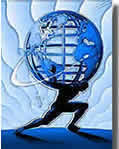
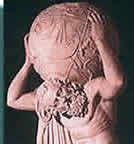 stood on the Earth and held up the "firmament" —the
solid dome of the sky.
stood on the Earth and held up the "firmament" —the
solid dome of the sky.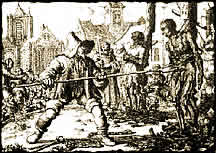 The
Ancients were like us...
The
Ancients were like us...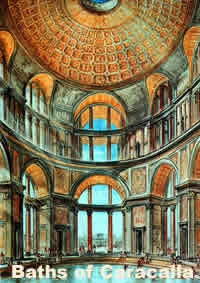 Earlier,
between about
Earlier,
between about 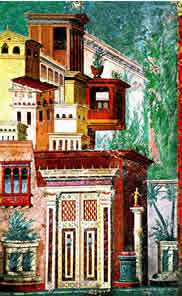 Enduring
civic institutions brought
Enduring
civic institutions brought 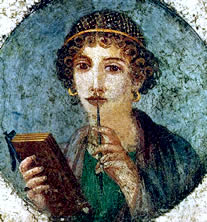 We
call this first great historical western flowering "Ancient Civilization."
We
call this first great historical western flowering "Ancient Civilization."
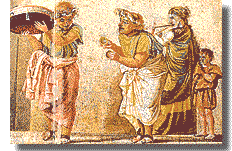
 If your ancient history comes from school, chances are you have in mind
Homer's Iliad, Shakespeare's Caesar, and tables of emperors—dull,
distant stuff you maybe try to like because appreciating this
crap is one of the things that makes fancy people fancy.
If your ancient history comes from school, chances are you have in mind
Homer's Iliad, Shakespeare's Caesar, and tables of emperors—dull,
distant stuff you maybe try to like because appreciating this
crap is one of the things that makes fancy people fancy.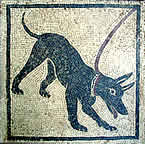
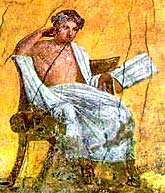
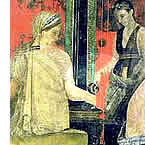 Do
that and you'll discover an explosion of life and vitality.
You will see and hear and touch and smell, across a hundred generations,
real people busy enjoying real lives.
Do
that and you'll discover an explosion of life and vitality.
You will see and hear and touch and smell, across a hundred generations,
real people busy enjoying real lives.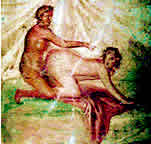
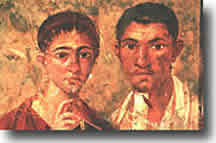
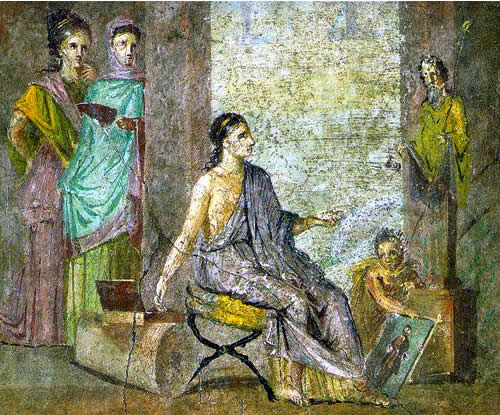 Truth
is they were people, just like the people you know: some smart, some
dumb, most in between. Like us. And they weren't primitive. It's true
they didn't have choo-choo trains and digital watches, but they did
have
Truth
is they were people, just like the people you know: some smart, some
dumb, most in between. Like us. And they weren't primitive. It's true
they didn't have choo-choo trains and digital watches, but they did
have 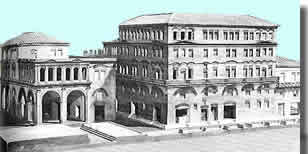
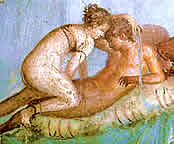
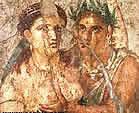
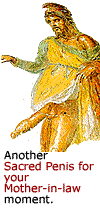

 You
and I
You
and I 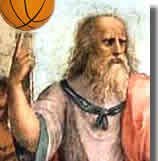 The
ancients'
The
ancients' 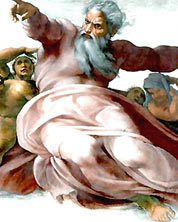 nature
to explain cause and effect, the ancients invented invisible,
intelligent personalities to cause the sun to move, a fire
to burn, and dice to roll as they did. They invented the Gods. In fact
they invented a medley of
nature
to explain cause and effect, the ancients invented invisible,
intelligent personalities to cause the sun to move, a fire
to burn, and dice to roll as they did. They invented the Gods. In fact
they invented a medley of